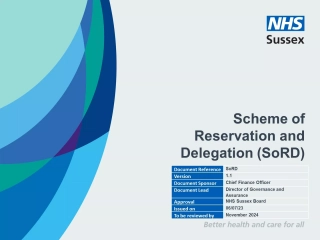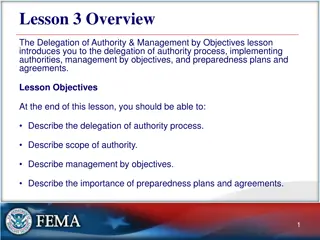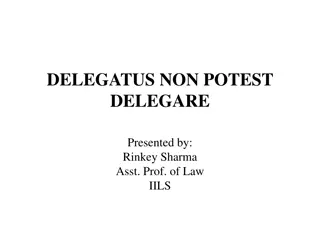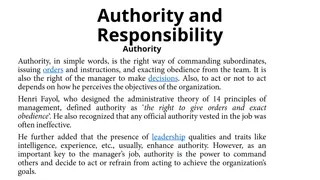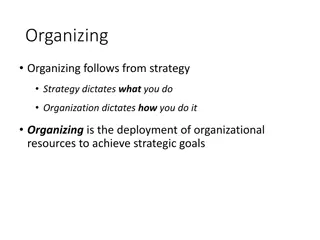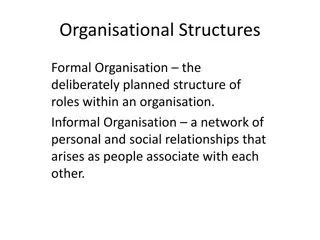Delegation of Authority in Management
Delegation of authority in management is a crucial process where managers assign tasks to subordinates, allowing them to exercise authority on their behalf. Louis A. Allen defined authority as the rights entrusted to a position holder to enable task performance. Effective delegation involves elements like responsibility, granting authority, and being accountable for performance. While authority can be delegated, responsibility, denoting assigned duties, and accountability for task execution cannot be delegated.
Download Presentation

Please find below an Image/Link to download the presentation.
The content on the website is provided AS IS for your information and personal use only. It may not be sold, licensed, or shared on other websites without obtaining consent from the author.If you encounter any issues during the download, it is possible that the publisher has removed the file from their server.
You are allowed to download the files provided on this website for personal or commercial use, subject to the condition that they are used lawfully. All files are the property of their respective owners.
The content on the website is provided AS IS for your information and personal use only. It may not be sold, licensed, or shared on other websites without obtaining consent from the author.
E N D
Presentation Transcript
Delegation of authority and decentralisation Delegation of authority is a process by which a manager assigns some of the basic task within his work jurisdiction to his subordinates on a selective basis allows him to exercise authority on his behalf to accomplish the task and makes him accountable for performance.
Continue Concept of authority Louis A. Allen has defined authority "as the rights entrusted to a position folder to make possible the performance of the work assigned".
Continue Features of managerial authority Authorities are right or power to command and control the subordinates. It is granted to a position holder for the achievement of specific objectives. The authority may be exercised through persuasion or sanctions. The purpose of exercising authorities is to influence the behaviour and actions of subordinates in the direction of organisational objectives.
Concept and elements of delegation Louis Allen has define delegation of authority as "delegation is a dynamics of Management; it is the process a manager follows in dividing the work assigned to him so that he performs that part which only he can perform and so that he can effectively get others to help him.
Continue Elements of delegation of authority Assignment of responsibility Granting authority Accountability for performance
Continue Responsibility: Responsibility denotes the work or duties assigned to a person by virtue of his position in the organisation. Authority: Authority is the right granted to an employee to make possible the performance of work assigned. Accountability: Accountability is the obligation to carry out responsibility and exercise authority in terms of performance standards established by the superior.
Can both authority and responsibility be delegated? Authorities the right or power granted to an individual to make possible for him to do the work effectively. the right to procure auto use raw materials, spend money, hire people, etc. has to be delegated to the person to whom what is a signed. this means that authority can be delegated. but responsibility is the sense of accountability cannot be delegated. it is an obligation to carry out the task assigned and exercise the authority judiciously.
Continue Accountability cannot be delegated though it is incurred as a result of assignment of duty and conferring of authority, accountability in itself cannot be delegated.
Flow of Authority and Accountability Authority A A B B C Accountability C
Types of delegation of authority Delegation of authority can take the following forms under different situation: Written or oral delegation: preferably authority must be delegated in writing, oral delegation misunderstanding. may create confusion and Delegation of general or specific authority: in case of general delegation the authority is delegated in the same form and spirit as written by the original officer. Lateral delegation: in this delegation the subordinate has to perform work with the help of his colleagues of his own level. Formal delegation: the subordinates themselves assume work just to please your superiors and use his authorities without any formal delegation.
Obstacles in delegation On the part of the superior Resistance Lack of ability to plan and direct Lack of willingness to let go Map of willingness to trust subordinates Lack of control On the part of the subordinates Subordinates may lack self-confidence because of incompetence or fear of failure Subordinates may fear criticism. Some people prefer to depend upon the boss for decision making Subordinates will not accept delegation when they are already over burden. On the part of the organisation Defective organisation structure and non clarity of authority responsibility relationships. Lack of effective control in bigger organisations Inadequate planning in new organisations
Decentralization of authority/diffusion of authority According to Mc. Farland Decentralization is a situation in which ultimate authority to command and ultimate responsibility for results is localised as far down in the organisation as efficient management of the organisation permits. According to Allen decentralization refers to the systematic effort to delegate to the lowest levels all authority except that which can only be exercised at Central points.
Continue Decentralisation is an extension of delegation which means entrustment of responsibility e and authority from one individual to another but decentralization means scattering of authority throughout the organisation. What is the diffusion of authority within the entire enterprise.


